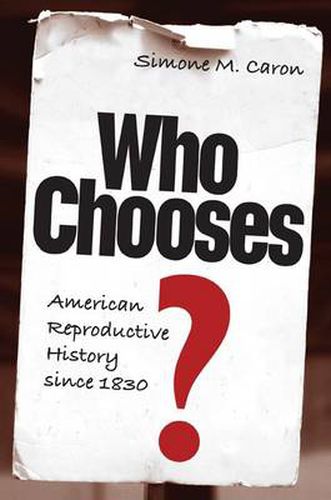Readings Newsletter
Become a Readings Member to make your shopping experience even easier.
Sign in or sign up for free!
You’re not far away from qualifying for FREE standard shipping within Australia
You’ve qualified for FREE standard shipping within Australia
The cart is loading…






This title is printed to order. This book may have been self-published. If so, we cannot guarantee the quality of the content. In the main most books will have gone through the editing process however some may not. We therefore suggest that you be aware of this before ordering this book. If in doubt check either the author or publisher’s details as we are unable to accept any returns unless they are faulty. Please contact us if you have any questions.
This book is the first to synthesize the intertwined histories of contraception, sterilization, and abortion in nineteenth- and twentieth-century America. Caron skillfully blends the local study of reproductive history in the state of Rhode Island into her thorough re-telling of the larger story that played out on the national stage. –Elizabeth Watkins, University of California, San Francisco
Offers a wealth of new research into the politics of reproduction. The close attention Caron devotes to debates and transformations within the African-American community provides a revealing counterpoint to the larger national picture. –Amy S. Greenberg, Pennsylvania State University
In 1860, the American Medical Association launched a campaign to convince state legislatures to prohibit abortions. Until 1973’s Roe v. Wade, abortion was often seen as a crime. Who Chooses? analyzes the forces at play in shaping reproductive policy in the United States.
Over the past two centuries, restrictive reproductive policies have often served as barriers to women’s equality. The impact of these policies has been felt most poignantly at the local level by women endeavoring to control their daily lives. Simone Caron reveals that despite attempts by population controllers to shape the populace according to their own agendas, women throughout the years have sought means to choose for themselves the best reproduction option to suit their personal situation. She examines the political, moral, and economic forces that shaped reproductive policies and the impact they have had on women’s ability to choose how to control their bodies.
Simone M. Caron is chair and associate professor of history at Wake Forest University.
$9.00 standard shipping within Australia
FREE standard shipping within Australia for orders over $100.00
Express & International shipping calculated at checkout
This title is printed to order. This book may have been self-published. If so, we cannot guarantee the quality of the content. In the main most books will have gone through the editing process however some may not. We therefore suggest that you be aware of this before ordering this book. If in doubt check either the author or publisher’s details as we are unable to accept any returns unless they are faulty. Please contact us if you have any questions.
This book is the first to synthesize the intertwined histories of contraception, sterilization, and abortion in nineteenth- and twentieth-century America. Caron skillfully blends the local study of reproductive history in the state of Rhode Island into her thorough re-telling of the larger story that played out on the national stage. –Elizabeth Watkins, University of California, San Francisco
Offers a wealth of new research into the politics of reproduction. The close attention Caron devotes to debates and transformations within the African-American community provides a revealing counterpoint to the larger national picture. –Amy S. Greenberg, Pennsylvania State University
In 1860, the American Medical Association launched a campaign to convince state legislatures to prohibit abortions. Until 1973’s Roe v. Wade, abortion was often seen as a crime. Who Chooses? analyzes the forces at play in shaping reproductive policy in the United States.
Over the past two centuries, restrictive reproductive policies have often served as barriers to women’s equality. The impact of these policies has been felt most poignantly at the local level by women endeavoring to control their daily lives. Simone Caron reveals that despite attempts by population controllers to shape the populace according to their own agendas, women throughout the years have sought means to choose for themselves the best reproduction option to suit their personal situation. She examines the political, moral, and economic forces that shaped reproductive policies and the impact they have had on women’s ability to choose how to control their bodies.
Simone M. Caron is chair and associate professor of history at Wake Forest University.